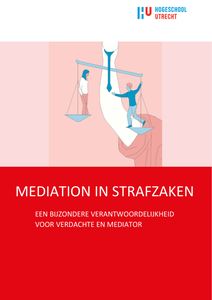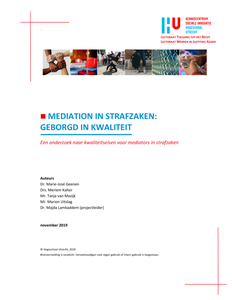Artikel over de relevantie van de regionale schaal voor hedendaagse ruimtelijke ordening en een voorstel over hoe de complexe processen van planning, ontwerp en governance door een externe partij - de mediator - zou kunnen worden uitgevoerd. Historische link met de mediator rol van de RPAA, Regional Plannaning Association of America, in de jaren '20-'30.
DOCUMENT
Full text via link met HU account De mediator in strafzaken opereert op een bijzonder terrein dat specifieke eisen stelt aan de mediator: kennis hebben op het terrein van het strafrecht, kennis hebben van psychiatrische/psychische problematiek en in staat zijn om zo nodig een netwerk van deskundigen op dat terrein te raadplegen, opereren in de vaak complexe dader-slachtofferverhouding en in staat zijn om ook met hoog-geëscaleerde conflicten om te gaan. In deze bijdrage signaleren we dat deze vereisten aan de mediator in strafzaken een aantal vragen oproept aangaande de in Nederland van kracht zijnde MfN-regels, die niet specifiek zijn geschreven voor toepassing in het kader van het strafrecht en waarmee de Nederlandse MfN-mediator in strafzaken wel moet opereren
LINK
Samenvatting boek: Dit boek staat stil bij de spanning tussen verharding, vechten en straffen aan de ene kant, en de noodzaak tot bemiddeling, conflictbeslechting en heling aan de andere kant. Hoe uit zich dat in de mediationpraktijk? Biedt dit soms ook nieuwe mogelijkheden voor mediation? Hoe zou transformatieve mediation hierbij een rol kunnen spelen? Hoe kunnen de slachtoffers worden bijgestaan? Naast deze problematiek worden in het boek ook andere actuele thema’s op het terrein van mediation uitgediept, zoals geschiloplossing in familiebedrijven, het nieuwe ontslagrecht en exit-mediation, nalatenschapsmediation, mediation in de zorg, en het belang van mediation bij de rechtenstudie. Hoofdstuk opgave De mediator in conflict: bivakkeren in ingewikkeldheden 1. Inleiding 2. Spanningen in conflicten 3. De lastige driehoeksverhouding 4. De mediator in het middelpunt van het conflict 5. Tot slot Referenties
LINK
Professionals moeten tijdens het gehele mediationproces omgaan met het thema ‘verantwoordelijkheid nemen’ door de verdachte. Zij komen echter een aantal knelpunten tegen. Wat is bijvoorbeeld nodig qua verantwoordelijkheid nemen om door te verwijzen naar de volgende fase in het mediationtraject? Hoe kunnen mediators verantwoordelijkheid nemen stimuleren en op welke manier kunnen zij dit omschrijven in de slotovereenkomst? De hoofdvraag van dit onderzoek is daarom: ‘Welke criteria kunnen stakeholders (rechters, officieren van justitie, mediationfunctionarissen en mediators) hanteren bij het vaststellen en stimuleren van ‘verantwoordelijkheid nemen door een verdachte’ tijdens het mediation in strafzaken traject en welk handelingsrepertoire is hiervoor nodig? Door middel van interviews met rechters, OvJ’s, mediationfunctionarissen, mediators, strafrechtadvocaten, slachtoffers en verdachten alsook via focusgroepen met mediators en mediationfunctionarissen is deze vraag onderzocht.
DOCUMENT

Dit handboek is geschreven voor zowel de praktiserende mediator in strafzaken als de mediator die dat nog wil worden. Wij hopen dat dit handboek bijdraagt aan het zich eigen maken en/of verdiepen van de kennis en kunde die de praktijk van de mediator in strafzaken vraagt. Omdat niet alle (beginnende) mediators in strafzaken ook jurist zijn, is geprobeerd om de juridische informatie in dit boek zo te verwoorden dat ook de niet-jurist deze informatie kan begrijpen. De MfN (Mediationfederatie Nederland) vraagt van haar mediators een hbo-denkniveau; dit boek sluit hierbij aan en is geschreven op hbo-denkniveau. Mediation in strafzaken is een beroep in ontwikkeling. Dit handboek is daarom ook een boek in ontwikkeling. Mocht u aanbevelingen hebben voor de verdere ontwikkeling van dit handboek dan nodigen wij u van harte uit om die met ons te delen
DOCUMENT

In een tijd van grote maatschappelijke veranderingen in het sociale - en juridische domein, waarbij zelfredzaamheid en oplossingsgerichtheid centraal staan, worden professionals uitgedaagd om hun bijdrage te leveren aan effectieve en rechtvaardige oplossingen. Bij afhandeling van strafzaken wordt in toenemende mate gezocht naar oplossingen die niet alleen recht doen aan het aangedane leed, maar waarbij ook naar de toekomst wordt gekeken. Hoe kunnen we ervoor zorgen dat slachtoffers zich gehoord en erkend voelen en dat herstel kan plaatsvinden? Hoe kunnen we voorkomen dat delictgedrag zich herhaalt? Het herstelrecht, en ook de ontwikkelingen binnen het herstelrecht, zoals mediation in strafzaken, sluiten hierop aan. Tijdens de onderzoeken ‘Strafrechtmediation: geborgd in kwaliteit’ (2017-2019) en ‘Mediation in strafzaken: een bijzondere verantwoordelijkheid voor verdachte en mediator’ (2022-2024), uitgevoerd door de lectoraten ‘Toegang tot het Recht’ en ‘Werken in Justitieel kader’ van Hogeschool Utrecht is onderzoek gedaan naar de kwaliteitseisen waaraan een mediator in strafzaken moet voldoen en naar het thema verantwoordelijkheid nemen door een verdachte tijdens een mediation in strafzaken.
DOCUMENT

Human activity is omnipresent in our landscapes. Animals can perceive risk from humans similar to predation risk, which could affect their fitness. We assessed the influence of the relative intensity of recreational activities on the bodyweight and pregnancy rates of red deer (Cervus elaphus) between 1985 and 2015. We hypothesized that stress, as a result of recreational activities, affects the pregnancy rates of red deer directly and indirectly via a reduction in bodyweight. Furthermore, we expected non-motorized recreational activities to have a larger negative effect on both bodyweight and fecundity, compared to motorized recreational activities. The intensity of recreational activities was recorded through visual observations. We obtained pregnancy data from female red deer that were shot during the regular hunting season. Additionally, age and bodyweight were determined through a post-mortem examination. We used two Generalized-Linear-Mixed Models (GLMM) to test the effect of different types of recreation on (1) pregnancy rates and (2) bodyweight of red deer. Recreation had a direct negative correlation with the fecundity of red deer, with bodyweight, as a mediator as expected. Besides, we found a negative effect of non-motorized recreation on fecundity and bodyweight and no significant effect of motorized recreation. Our results support the concept of humans as an important stressor affecting wild animal populations at a population level and plead to regulate recreational activities in protected areas that are sensitive. The fear humans induce in large-bodied herbivores and its consequences for fitness may have strong implications for animal populations.Projectnummer: SVB/RAAK.PRO 02.048
LINK
Mensen en conflicten zijn onlosmakelijk met elkaar verbonden. Tijdens conflicten is er vaak sprake van machtsongelijkheid tussen partijen. Deze ongelijkheid in de machtsverhouding tussen partijen is regelmatig onderwerp van gesprek tussen mediators. Dit vormde de aanleiding voor een onderzoek naar de machtbalans in arbeidsmediations. De ervaringen opgedaan tijdens dit onderzoek nemen we mee in dit artikel en we pogen een antwoord te geven op de vraag ‘Heeft de mediator een rol in het herstellen van het machtsevenwicht tijdens een Mediation waarbij sprake is van machtsongelijkheid tussen partijen?’
DOCUMENT

Mediation in strafzaken is een bemiddelingsproces dat in gang kan worden gezet als een officier van justitie of rechter, al dan niet op verzoek van een slachtoffer, verdachte of advocaat, naar een mediator in strafzaken doorverwijst. Na enkele pilots in 2010 is mediation in strafzaken in 2017 landelijk uitgerold en vanaf 2018 structureel gefinancierd. Borging van de kwaliteit van het mediationtraject ligt vooral in de borging van de kwaliteit van de mediators. Er is echter nog onvoldoende kennis over de (mogelijk specifieke) competenties die mediators in strafzaken dienen te hebben. Een beknopte literatuurstudie laat zien dat internationale en Europese instrumenten wijzen op het belang van goed opgeleide mediators. De meeste regels zijn vrij algemeen van aard en laten veel ruimte voor een nationale invulling. De Slachtofferrichtlijn van de Europese Commissie is een bindend instrument, waarin onder andere duidelijk is opgenomen dat secundaire victimisatie voorkomen dient te worden en dat slachtoffers volledig en duidelijk geïnformeerd dienen te worden. Onderhavig onderzoek naar opvattingen van de verschillende stakeholders over te hanteren kwaliteitseisen laat zien dat er geen grote verschillen zijn tussen rechters, officieren van justitie, strafrechtadvocaten, mediationfunctionarissen en mediators.
DOCUMENT

This paper assesses the impact of perceived HRM practices on organisational citizenship behaviour (OCB) and whether leader membership exchange (LMX) mediates this relationship. The required research data were retrieved from four different departments within a logistics and supply chain management organisation. The results show that there is a significant relationship between the HRM practices as perceived by a subordinate and their level of organisational citizenship behaviour. The relationship that subordinates have with their frontline manager (LMX) acts as a significant mediator. In the final section, of this paper the findings are discussed and recommendations for future research and practical implications are given.
DOCUMENT
